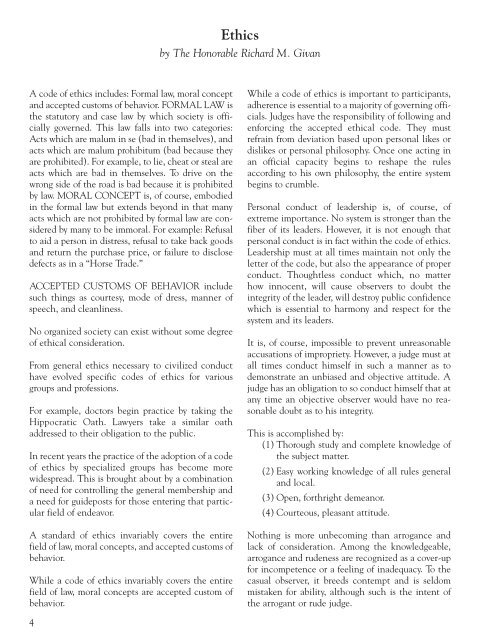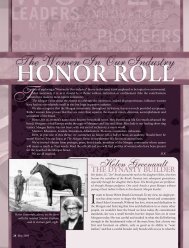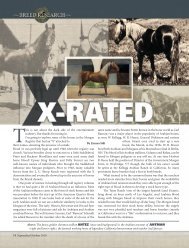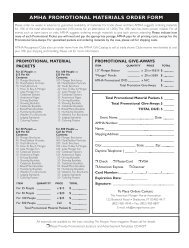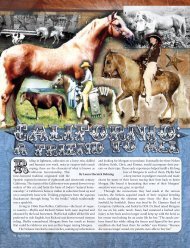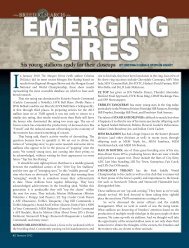Judging School Handbook - American Morgan Horse Association
Judging School Handbook - American Morgan Horse Association
Judging School Handbook - American Morgan Horse Association
Create successful ePaper yourself
Turn your PDF publications into a flip-book with our unique Google optimized e-Paper software.
Ethicsby The Honorable Richard M. GivanA code of ethics includes: Formal law, moral conceptand accepted customs of behavior. FORMAL LAW isthe statutory and case law by which society is officiallygoverned. This law falls into two categories:Acts which are malum in se (bad in themselves), andacts which are malum prohibitum (bad because theyare prohibited). For example, to lie, cheat or steal areacts which are bad in themselves. To drive on thewrong side of the road is bad because it is prohibitedby law. MORAL CONCEPT is, of course, embodiedin the formal law but extends beyond in that manyacts which are not prohibited by formal law are consideredby many to be immoral. For example: Refusalto aid a person in distress, refusal to take back goodsand return the purchase price, or failure to disclosedefects as in a “<strong>Horse</strong> Trade.”ACCEPTED CUSTOMS OF BEHAVIOR includesuch things as courtesy, mode of dress, manner ofspeech, and cleanliness.No organized society can exist without some degreeof ethical consideration.From general ethics necessary to civilized conducthave evolved specific codes of ethics for variousgroups and professions.For example, doctors begin practice by taking theHippocratic Oath. Lawyers take a similar oathaddressed to their obligation to the public.In recent years the practice of the adoption of a codeof ethics by specialized groups has become morewidespread. This is brought about by a combinationof need for controlling the general membership anda need for guideposts for those entering that particularfield of endeavor.A standard of ethics invariably covers the entirefield of law, moral concepts, and accepted customs ofbehavior.While a code of ethics invariably covers the entirefield of law, moral concepts are accepted custom ofbehavior.While a code of ethics is important to participants,adherence is essential to a majority of governing officials.Judges have the responsibility of following andenforcing the accepted ethical code. They mustrefrain from deviation based upon personal likes ordislikes or personal philosophy. Once one acting inan official capacity begins to reshape the rulesaccording to his own philosophy, the entire systembegins to crumble.Personal conduct of leadership is, of course, ofextreme importance. No system is stronger than thefiber of its leaders. However, it is not enough thatpersonal conduct is in fact within the code of ethics.Leadership must at all times maintain not only theletter of the code, but also the appearance of properconduct. Thoughtless conduct which, no matterhow innocent, will cause observers to doubt theintegrity of the leader, will destroy public confidencewhich is essential to harmony and respect for thesystem and its leaders.It is, of course, impossible to prevent unreasonableaccusations of impropriety. However, a judge must atall times conduct himself in such a manner as todemonstrate an unbiased and objective attitude. Ajudge has an obligation to so conduct himself that atany time an objective observer would have no reasonabledoubt as to his integrity.This is accomplished by:(1) Thorough study and complete knowledge ofthe subject matter.(2) Easy working knowledge of all rules generaland local.(3) Open, forthright demeanor.(4) Courteous, pleasant attitude.Nothing is more unbecoming than arrogance andlack of consideration. Among the knowledgeable,arrogance and rudeness are recognized as a cover-upfor incompetence or a feeling of inadequacy. To thecasual observer, it breeds contempt and is seldommistaken for ability, although such is the intent ofthe arrogant or rude judge.4


